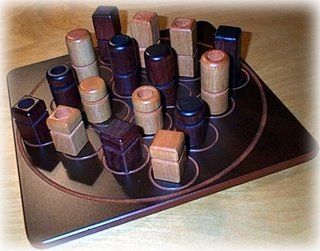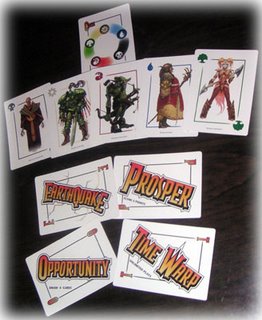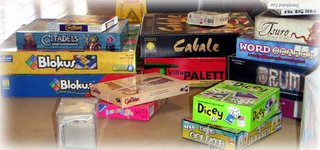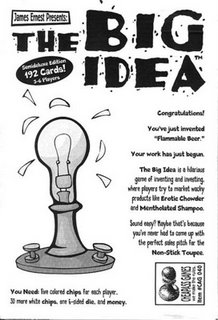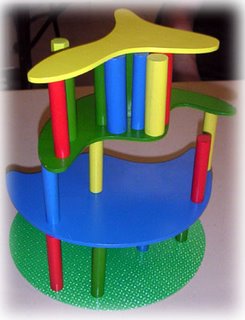I basically made notes on some random scrap paper, and did a lot of scribbling. I'm not sure if the chronology of what is about to be reported is correct, but I will try to make sure I include the whole day.
Coda
Players: Jake, Sean, Angie, Chris
 This is an amazingly simple game, which requires an amazing amount of logic.
This is an amazingly simple game, which requires an amazing amount of logic. Borrowing some elements of Mastermind, this is a great code-breaking game. I have only ever played this game with 2 players before -- with 4 players, the brain strain is exponentially greater.
The point of the game: You are trying to keep your code secret for the longest.
There are 24 game pieces -- they are numbered 0 through 11 in two colors (0-11 in white, 0-11 in black). In a 4-player game, all players draw three tiles at random, and arrange them in order from lowest to highest.
On each turn, a player grabs one of the unused tiles and looks at it. Then, with the information that player has, the player picks a specific hidden tile in front of a specific player and guesses its value. If the guess is correct, the player must reveal that tile. AND the active player gets to keep guessing, if desired. OR, the player can choose to stop guessing, and add the tile grabbed from the pool to their own hidden tile bank.
If the guess is wrong, that active player must reveal the tile grabbed from the pool, and place it among their own tiles in its rightful ordered place, revealing a little bit about their own hidden tiles.
Once a players pieces have been all revealed, that player is no longer a part of the game. The last player to have secret tiles wins.
Angie rocked this game. She eliminated Sean first, then Chris, and, finally Jake.
Angie wins! Not only that, but she eliminated every other player single-handedly!
We then broke into a couple teams sets of people... one set playing the game "Munchkin", and the other Playing "Star Munchkin".
Let's look at each...
Munchkin
Players: Jake, Danielle, Rob
 This is a funny little game, which kind of picks on role playing games. Each player has a race and a class, as well as a level. You attempt to level up by beating up on monsters. The first player to reach level 10 wins.
This is a funny little game, which kind of picks on role playing games. Each player has a race and a class, as well as a level. You attempt to level up by beating up on monsters. The first player to reach level 10 wins.Of course, there is armor, and footwear and headgear to help your character, as well as ways to beef up monsters that other players have to face in order to make them harder to defeat. You can call for help, but a helping player will definitely ask for some kind of compensation.
The gameplay is rather fluid, almost too much so for my strict gaming tastes. It actually reminds me a little of Beer Money, which we played a few weeks back... it has a sort of mushiness.
In this game of Munchkin -- after hanging back for a long time, Rob surged ahead to hit level 10 first. Rob wins!
Star Munchkin
Players: Rich, Angie, Sean, Chris
This is an expansion, of sorts, to Munchkin. I picked it up mainly because it was a kitchy, campy, game that takes place in space. It has the same game dynamic as Munchkin, (in fact, you can combine the games) but it has more of a space-related content, as opposed to a fantasy theme.
If I had ever played the game, I would have never have paid $25 for what is ostensibly a card game. The artwork is cute, the text on them is funny, the gameplay is twisted. You basically play as many cards as you can -- possibly I haven't gone though it enough to get any strategy. So far as I can tell, there is little. I found little satisfaction in the game, which is interesting, since I won the game. But I felt like I somehow didn't earn it, it just happened.
I might need to try it a few more times...
Either way... Chris wins!
Blokus
Players: Danielle, Eugene, Rob, Jake

Blokus. Best game ever. Nothing left to say.
The usual made-up strategy names happened. The normal frustration and screwage occurred.
Here's how it ended...
| Danielle | -19 |
| Eugene | -4 |
| Rob | -10 |
| Jake | -4 |
Jake and Eugene tie for the win!!

Cityscape
Players: Rich, Angie, Manny, Chris, Sean (filling in for Angie)
Cityscape is a recent addition, and it is wonderful. It is quick, but ultra-strategic. We've described it before, so there's no need to go into much detail now. Just go buy it for yourself... you'll be glad you did.

We played two games with Rich, Angie, Manny, and Chris...
| Rich | Angie | Manny | Chris |
| 40 | 60 | 10 | 40 |
| 0 | 40 | 30 | 50 |
| Totals... | |||
| 40 | 100 | 40 | 90 |
Angie is having a good day. BUT, she has to leave... Sean takes up the slack!
| Rich | Sean | Manny | Chris |
| 50 | 10 | 20 | 70 |
| 60 | 20 | 10 | 30 |
| Totals... | |||
| 110 | 30 | 30 | 100 |

Rich wins over those two games!
Cityscape is a fun strategy game with a good deal of intentional and unintentional screwage.
Tsuro
Players: Sean, Manny, Chris, Rich
 This is one of Manny's favorite games, and we obliged his request to play -- it's a quick game, and a good filler while the other crew finished Blokus.
This is one of Manny's favorite games, and we obliged his request to play -- it's a quick game, and a good filler while the other crew finished Blokus.The rules never say this -- but we always explain the game Tsuro as an allegory for life -- you choose a path, and add to that path. If the path leads you off the board, you die. That last one alive wins. This seems to make sense... everyone picks up the idea quickly. There is a lot of luck in the game, but it always feels like the choices you make MATTER. You may not be able to win, but it always feels like you've tried you best... sometimes life's path runs you in a bad direction.
This is the first board game by the company "Wizkids". They mainly make collectible games -- I hope they continue to make other games -- this is a nifty one.
 Rich backed himself into a corner first, and Manny had no problem causing his death.
Rich backed himself into a corner first, and Manny had no problem causing his death.Then, in a karmic twist, Manny backed himself into an inescapable corner.
Sean and Chris ended up in close place on the board, and Sean had no option but to place a tile killing them both... Sean and Chris tie for the win!!
Apples to Apples
Players: Jake, Eugene, Rich, Sean, Manny, Chris, Selena (who left early)
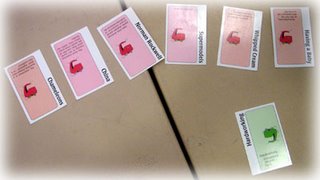 Possibly the simplest and funniest game we play. It's strange we like it so much, since there's not much strategy. The only strategy is playing the funniest card you can -- depending on the judge. I guess it has a little of the psycho-strategy we like in some other games... Or, maybe it's because it is a refreshing change from the other games that require more brain power. I know a lot fo people who like this game because even if you lose it really doesn't reflect on any real ability... there's little definable skill involved.
Possibly the simplest and funniest game we play. It's strange we like it so much, since there's not much strategy. The only strategy is playing the funniest card you can -- depending on the judge. I guess it has a little of the psycho-strategy we like in some other games... Or, maybe it's because it is a refreshing change from the other games that require more brain power. I know a lot fo people who like this game because even if you lose it really doesn't reflect on any real ability... there's little definable skill involved.Anyway... Here's how the game went:
- Sean got the card "courageous"
- Eugene got "intelligent"
- Rich got "hardworking"
- Jake got "relaxing"
- Eugene got "wild"
- Rich got "hilarious"
- Manny got "unforgettable"
- Sean got "shocking"
- Manny got "creative"
- Sean got "busy" (heh. heh. I said 'Sean got busy.')
- (at this point Selena had to run)
- Eugene got "odd"
- Eugene got "perfect"
- Chris got "luxurious"
- Eugene got "pathetic"
- Manny got "powerful"
- Rich got "chunky" (stop laughing. right now, you 7th grader.)
- Jake got "influential"
- Rich got "refreshing"
We all realized that it would be a while before any of us caught up to Eugene, so we called the game to move on to something else.
Eugene wins!!
Things...Humor in a Box
Players: Jake, Eugene, Rich, Sean, Manny, Chris, and Angie joined a little later
 I love this game -- it's a great one for bunches of people.
I love this game -- it's a great one for bunches of people.A topic is read, and everyone writes down something in that topic. Then, each player tries to guess who made what response. The more you know about the other players, the greater your advantage. AND, the more you play, the more you'll learn about the other players.
If I was slightly more insane than I already am, I would have recorded every response made to every topic. Instead, I just recorded the final tallies/scores for the players.
| Jake | Eugene | Rich | Sean | Manny | Chris | Angie |
| 8 | 6 | 10 | 7 | 6 | 9 | 2 (+5 pity points for late start) = 7 |
Rich wins! And he's just a guest!! He's here while he's on break from UMass. The guest beat us at our own game. Not good. NOT good.
Here's all the "Things" we wrote about in the game...

And here's the bottle, into which we crammed all our answers when they were eliminated from the game...

Pass the Pigs
Players: Chris, Sean, Steven, Cathy, Angie, Manny
Cathy W. came back to play, and brought her son Steven. He's 8 years old, but ready to play.
I thought Pass the Pigs would be a silly, fun, easy to learn game. It turned out I was right!!

Pass the Pigs uses pig-shaped dice. Depending on how the pigs fall, you get points. You never want the pigs to land on their sides, with opposite sides showing. This is called a "Pig Out", and costs you all points earned that turn. Other combinations of pigs is worth points -- the less common configurations are worth more points. Normally a dice game would be non-strategic, but this game puts you in control. You can push your luck for more and more points, or play conservatively and build up few points at once. A standard game is played to 100, and we did that.
Here's the scores at the end of the game...
| Chris | Sean | Steven | Cathy | Angie | Manny |
| 47 | 80 | 93 | 51 | 102 | 35 |
Steven had a slow start, but burst onto the scene quickly. He was in the lead for most of it, and Angie was in last for most. Angie had a couple good rolls back-to-back, and claimed victory before Steven could finish up.....
Angie wins!
Pass the Pigs is a fun coffee-shop or bar game. It's portable, simple, fun, and funny.
Ido
Players: Chris, Sean, Steven, Angie (filled in by Cathy)
Ido is a beautiful game. I've mentioned this before.
 I do like this game a whole lot. I love how it looks, and I enjoy how it plays. It's simple to learn, and has clever strategy. The board morphs throughout the game, and as it does, there are different movement possibilities (or impossibilities).
I do like this game a whole lot. I love how it looks, and I enjoy how it plays. It's simple to learn, and has clever strategy. The board morphs throughout the game, and as it does, there are different movement possibilities (or impossibilities). I was worried that 8-year-old Sean would have trouble with the 12-and-up-suggested age level on the Ido box, but he picked it up quicker than most of the college students who've I've shown it to.
Steven was the FIRST with a piece off the board. Followed by Chris, then Cathy, then Sean.
Chris was the first to get his second piece off the board. Sean, Steven, and Cathy (in that order) followed suit.
At this point, any piece off the board would win the game. Sean shifted the grid so that Chris would win. He realized his folly, and then, after whining like a schoolgirl, we let him undo his move. As I wrote those events down, Sean grabbed my note paper and indicated: "When Sean threatened to erase Chris's unsavory remarks, Chris wept openly. ALSO, The Beastie Boys are the ONLY white people who can rap."
Both of those are reasonable points.
Still, the Sean move was deemed official, and Chris wins!!!
Dicey
Players: Sean, Steven, Cathy, Chris

I like building games like Jenga and Villa Paletti. Dicey has elements of that. I forget when I actually bought this game, but I have had it for a while and have wanted to play it.
Each player gets some cards with dice printed on them. Each player, in turn, places the dice on the card, as indicated, and stacks in on the previously played cards and dice.

If a player causes the fall of the pile, that players gets points equal to the faces of the dices which don't touch any of the cards. Lowest score wins!!
A delicate touch goes well in this game, as well as placement that creates good balance. It feels like building a house of cards.
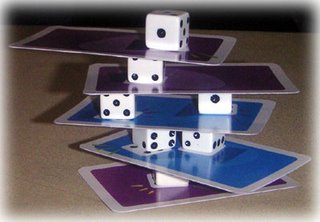
Here's the final totals when we decided to quit...
| Sean | Steven | Cathy | Chris |
| 0 | 94 | 13 | 26 |
Not only did Sean win, but he NEVER knocked over the pile. Sean wins!! And he wins nicely.

Unexploded Cow
Players: Sean, Eugene, Chris
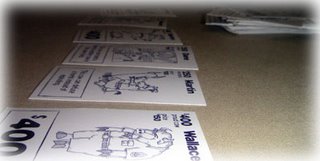
I've played this game a bunch, but not in Game Club. It has my FAVORITE game theme EVER.
There are these mad cows in Europe, as well as unexploded mines from previous world wars. Both need to be eliminated. OOH! Let's fix both problems at once: let the Mad Cows wander across the mine fields. Any mine eliminated also eliminates a mad cow.
 Each player starts with some cash ($2000), and some cards (cards have cows or actions). Each player plays any number of cards that player wishes, or can afford, and then rolls a die to see if any cows have stepped on a mine. Any cow exploded provides a reward or penalty to the owner of that cow. Also, if you blow up your own cow, you get a city card which has a point value on it.
Each player starts with some cash ($2000), and some cards (cards have cows or actions). Each player plays any number of cards that player wishes, or can afford, and then rolls a die to see if any cows have stepped on a mine. Any cow exploded provides a reward or penalty to the owner of that cow. Also, if you blow up your own cow, you get a city card which has a point value on it.When all city cards have been claimed, the person with the highest value of city cards collect any unclaimed money in the game.
Game end:
| Sean | Eugene | Chris |
| $1550 | $2650 | $1800 |
Eugene managed his cows the best. Eugene wins!!
Quarto!
Players: Eugene, Chris

Quarto is one of our new favorite two player games. Eugene has seen it being played, and found it rather intense. It didn't take much for Chris to talk him into a few games.
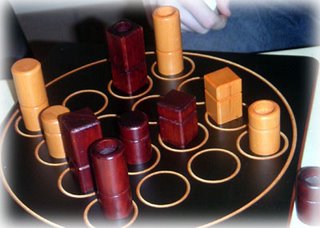
Chris did end up winning three games in a row. But he had played a bunch, and Eugene was still new to the game, Eugene was always well aware of the board, but Chris managed to sneak in a win, three times or so in a row.
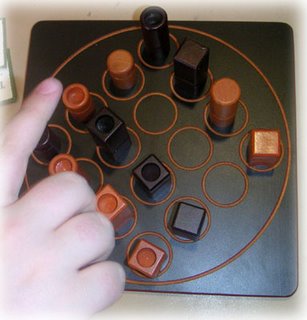
Chris wins three times! (the first two were for 4 round shapes in a row -- the last was for 3 short pieces in a row)
Cityscape
Players: Rob, Eugene, Chris, Jake

We finished the game with some more of the wondrously clever Cityscape. It is a fun game for two, and stressful game when three play, and a twisted struggle for four players. We played with all four!
Scores...
| Rob | Eugene | Chris | Jake |
| 20 | 10 | 40 | 40 |
| 10 | 60 | 50 | 20 |
| 50 | 50 | 30 | 60 |
| Totals....... | |||
| 80 | 120 | 120 | 120 |
After three rounds, we had a three way tie. And Chris had to go at this point (taking his games with him), so the tie is what we ended up with! Until next time...

Another great day of gaming!!
Some new games, some classics, some new players, some regulars.
I really do like games. Game Club rocks. Seriously.


